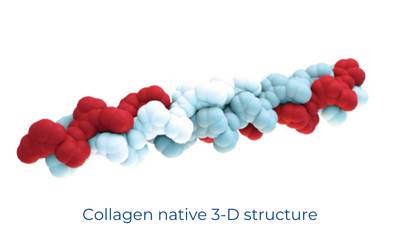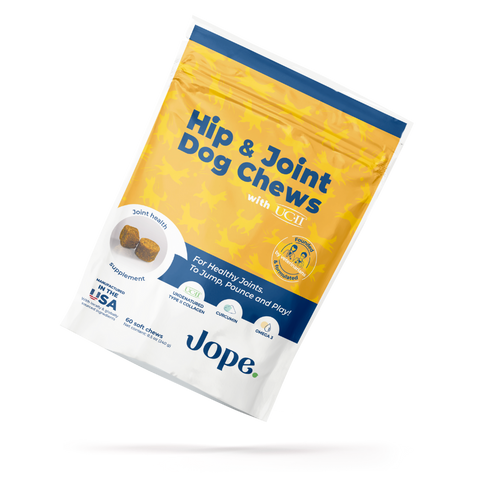No Products in the Cart
Collagen Benefits for Dogs - An Honest Vet Review

As a veterinarian, my pet parents often ask me about the benefits of collagen for dogs and if collagen is safe for dogs. Collagen is a protein found in the connective tissues of animals, including dogs, and plays a crucial role in maintaining their overall health and well-being. In this article, I will discuss the different types of collagen, their functions, and the best type of collagen for dogs.
What is collagen?
Collagen is a protein that the body produces and is a vital component of the connective tissues of animals, including dogs. It provides structure and strength to various body parts, including the skin, hair, nails, bones, and joints.
There are several types of collagen, including type I, II, and III, each with specific functions and locations in the body:
- Type I collagen is found in the skin, tendons, and ligaments.
- Type II collagen is present in cartilage.
- Type III collagen is found in the skin, blood vessels, and other organs.

Is collagen bad for dogs?
No, collagen is not bad for dogs. On the contrary, it is essential for maintaining their overall health and well-being. Collagen is a natural component of the body and is necessary for proper growth and development.
The best type of collagen for dogs: my opinion as a veterinarian
UC-II®, a patented type II collagen, also called undenatured type II collagen, has been shown in studies:
- To be the most effective when it comes to supporting joint health.
- To be more effective than chondroitin and glucosamine in relieving arthritic dogs from pain and discomfort.


As mentioned in this article, type II collagen is a main component of cartilage, which acts as a cushion between bones and helps absorb shock. As dogs age, their cartilage can break down, leading to joint discomfort, stiffness, and even joint pain. Supplementing your dog's diet with type II collagen can help to support joint health and mobility.

Type I collagen also benefits dogs, particularly in maintaining healthy skin and coat. If you’re looking for a solution for your dog’s coat, Omega-3, and Omega-6 are also good ingredients
What are the benefits of collagen in dogs?
Collagen has many benefits for dogs, including:
- Supporting joint health and mobility - consider using undenatured type II collagen, UC-II®.
- Improving skin and coat health- select type I or type III collagen.
- Promoting healthy nails and bones - choose type I collagen.
- Enhancing the overall health and well-being of dogs - all collagen types.
Which collagen should I take for my dog?
The current pet supplement market offers many options, and it's not easy to differentiate good supplements from bad ones. If most of the ones available are safe to use, they are not all created equal! Few are effective, and most types of collagen can't be used for everything. Regarding collagen, I recommend staying away from a "one-size-fits-all" approach.
My collagen joint health choice as a vet: Jope
If you're looking for joint support, I recommend Jope Hip & Joint Dog chews. Jope's formula contains UC-II®, patented undenatured type II collagen:
- it is clinically proven to be the best collagen for joint health
- it's been shown in studies to be more effective than chondroitin supplements to help dogs with joint issues.
- UC-II® is made with chicken cartilage; therefore, it's a natural source of collagen.

Jope dog joint chews also contain high doses of omega 3 (fish oil) and curcumin which synergize with type II collagen for maximum joint relief.
You can check our article about the Top 5 Collagen chews for dogs or the Best joint supplements for dogs if you want more information.


I recommend Jope's joint chews to people who care about nutritional formulas, as they use organic ingredients whenever possible and are cold-pressed to preserve the potency, efficacy, and overall quality of the ingredients, especially the vitamins and nutritional benefits of the carefully chosen ingredients.
Always consult your veterinarian before choosing supplements or other medications for your dog.
FAQ
Are there side effects to collagen for dogs?
Most types of collagen are well tolerated, but some can cause digestive upset in sensitive dogs. UC-II® collagen, however, is different. It works in very low doses and has been shown to be safe with no known side effects in clinical studies. Always introduce any supplement gradually and consult your vet if your dog has health concerns.
What are the first signs that collagen is working?
You may notice improved mobility, fewer signs of joint stiffness, better levels of energyand a happier, more active dog. Dogs might start jumping onto the sofa again, climbing stairs more easily, going for longer walks, and showing more energy overall. These signs often appear within a few weeks of consistent use, but the best results come after 3 months.
Is collagen hard on the liver?
Not exactly. Collagen is generally well tolerated and not known to stress the liver in healthy dogs. If your dog has a pre-existing liver condition, it’s best to check with your veterinarian before starting any supplement.
What should to avoid when taking collagen?
There are no specific contraindications for collagen in most dogs, but it's important to avoid giving it alongside any supplement or medication without first speaking to your vet. Always follow dosage guidelines and watch for any unusual reactions when starting something new.















Leave a comment